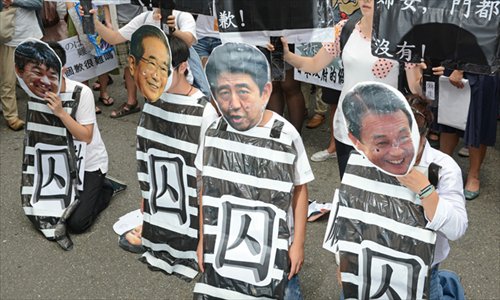Abe to make ritual offering at Yasukuni

Protesters wear masks of Osaka Mayor Toru Hashimoto (left), former Tokyo governor Shintaro Ishihara (second from left), Japanese Prime Minister Shinzo Abe (second from right) and Deputy Prime Minister Taro Aso (right) during a rally to demand an apology from Japan over the comfort women issue, in front of the Japan Interchange Association in Taipei on Wednesday. Historians say up to 200,000 young women, from the two Koreas, China, Indonesia and the Philippines, were forced to serve as sex slaves in Japanese army brothels during World War II. Photo: AFP
Japanese Prime Minister Shinzo Abe will reportedly make a ritual offering at the controversial Yasukuni Shrine on the 68th anniversary of Japan's surrender during World War II on Thursday instead of paying a visit.
However, the fine line taken by Abe is still deemed unacceptable by neighboring countries such as China and South Korea, who have been the most watchful toward the sensitive occasion in recent years as Tokyo slips further to the right under the hawkish Abe administration.
Japanese broadcaster NHK Wednesday quoted sources close to Abe as saying that the Prime Minister has decided not to visit the Yasukuni shrine, which honors Class-A war criminals, on Thursday, but will instead use his own money to pay for an offering of a branch of a sacred tree.
Sources said Abe wanted to prevent already rocky relations with China and South Korea, both victims of Japan's war acts, from worsening.
Beijing and Seoul have paid great attention to Thursday's anniversary, given it is the first such anniversary after the Liberal Democratic Party regained power.
Toh Lam-seng, Professor Emeritus at Japan's Ryukoku University, told the Global Times Wednesday that regardless of whether Abe personally visits there or not, his basic attitude was made clear long ago.
Abe did not visit Yasukuni during his previous term as prime minister from 2006 to 2007, an omission that he later described as "extremely regrettable," as the Japan Times reported.
"Abe's political view has never changed, no matter how he marks the anniversary, and now he is balancing domestic support with pressure from the international community," Ryo Sahashi, an associate professor of international politics with Japan's Kanagawa University, told the Global Times.
Lee Jong-won, a South Korean professor teaching at the Tokyo-based Waseda University, told South Korea's Yonhap News Agency on Wednesday that Abe's money offering "signals to inside and outside Japan that his conservative stance is not modified."
Lee also said, "That also means he implies he could visit the shrine anytime during his term, just not this time."
Four South Korean lawmakers Wednesday left for Tokyo, planning to stage a protest against the right-wing tendency of the Abe administration outside the Yasukuni Shrine on Thursday morning, according to South Korean media.
Japan's attitude toward its militarist past has long been a thorn in its relationship with neighboring countries and drawn criticism.
A Global Times reporter visited a war memorial park in Okinawa, which commemorates more than 200,000 Japanese who died in 1945, in the run-up to the anniversary.
The exhibition hall of the park only displayed exhibits on how the Japanese died during the war but had little information on how the war started.
In addition to historical issues, Japan's relations with China and South Korea have soured over territorial disputes.
The dispute over the Diaoyu Islands in the East China Sea have resulted in a hiatus in meetings between Chinese and Japanese leaders for almost a year, though Abe has recently been calling for dialogue.
Li Yiqiang, secretary-general of the World Chinese Alliance in Defense of the Diaoyu Islands, a group formed by civilian activists, said their team is planning a new round of activities to demonstrate Chinese claims to the islands, though a plan to sail to the Diaoyu waters on Thursday had been delayed.
"Our government has become more tough on this issue, but with some Japanese right-wing activists frequently entering the Diaoyu Islands waters, we also have to show our determination," Li said.
Separately, the maritime authorities in Liaoning Province sent out navigation warnings that a military mission will be conducted starting Thursday, fuelling speculation that the authorities chose the anniversary to test the aircraft carrier and its carrier-based aircraft.
Park Gayoung contributed to this story
Editorial: Japan risks repeating mistakes of history